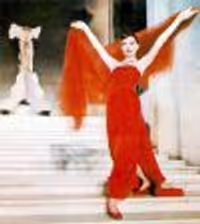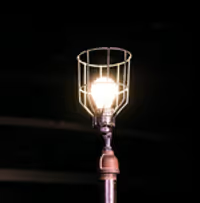Why Does The Witch Die In "Into the Woods"?
#75re: Why Does The Witch Die In 'Into the Woods'?
Posted: 2/19/07 at 12:24am
The thing is the show does not make any attempt to "endear" the Witch, the point of "Last Midnight" is not to make us feel bad for her, it's for us to understand her frustration, her motives, and to bring her arc to a close among other things. Lyrics like "you're so nice, you're not good, you're not bad, you're just nice; I'm not good, I'm not nice, I'm just right," do not go for pity.
I really do not think she dies. I believe she makes a dramatic exit since her mother has returned her to her old stage and pulled her away from those people.
bbabe24
Featured Actor Joined: 7/16/04
#76re: Why Does The Witch Die In 'Into the Woods'?
Posted: 2/19/07 at 12:52am
Maybe the word "endear" was not the best choice. True, we are not supposed to love the witch, but the song does help us understand her further, and thus by understanding her pain, motives, and frustrations, we DO feel sorry for her, maybe some do more than others.
I guess the song causes us to empathize with her character. We feel like we finally know her a little better after the song is over. Everyone's feelings/reactions to her are different based on personal experience and age. I know when I was younger I disliked her more than I do now because I empathized with Rapunzel more. Now I can see where the old lady was coming from. Not that I advocate locking up children in towers or anything like that!
husk_charmer
Broadway Legend Joined: 10/19/06
#77re: Why Does The Witch Die In 'Into the Woods'?
Posted: 2/19/07 at 2:14am
bbbabe-
I am seconding Ray here. You seem to be missing the point. Look at the lyrics. Nothing evokes pity. I love the Witch because she is such a B. She doesn't hold anything back, and she doesn't want pity.
Fabla-
I really disagree with your director's interpretation. If the Witch kills herself, it weakens her as a character. Maybe that's me though.
I've been doing a lot of thinking, and there's some more to this. In Wicca, there is a large emphasis on Mother figures, which probably plays a hand here.
Broadway Legend Joined: 12/31/69
#78re: Why Does The Witch Die In 'Into the Woods'?
Posted: 2/19/07 at 2:43am
The beauty of the Witch (pun not intended) is that she's the one character out to get what she wants, and actively goes about it. Compared to her, everyone else are these passive storybook characters who let the story happen to them. I have always felt the Witch is outside of that. But when she transforms to beautiful, she finds herself drawn into that fantasy world of everyone else.
I think she wants everyone to think she's dead, so they won't come bother her again. She's sick and tired of them and has no desire to deal with them. But any director who clearly indicates that she's dead right then automatically groups her in with all the other victims in the show, which makes zero sense. I'd much rather leave the characters with the eerie feeling that they've been "cursed" by her departure, and somewhere out there, she's laughing at their every move.
Danielm
Broadway Star Joined: 3/17/05
#79re: Why Does The Witch Die In 'Into the Woods'?
Posted: 2/20/07 at 4:17pmThe baker's wife has a tree branch fall on her--not the witch.
JunoWinter
Swing Joined: 3/10/08
#80re: Why Does The Witch Die In 'Into the Woods'?
Posted: 3/10/08 at 10:46am
It’s like “Live, Laugh, Love” from Follies. The Witch is having a mental breakdown.
"Last Midnight" is the result of everything that has happened to the Witch in the show. She becomes numbingly desensitized and explodes into a cloud of smoke from all the pressure. She
The song has a lot more emotional depth than most people think.
Updated On: 3/10/08 at 10:46 AM
#81re: Why Does The Witch Die In 'Into the Woods'?
Posted: 3/10/08 at 12:13pm
In the first national tour there was a sad little puff of smoke and you could see Cleo Laine stomping off stage.
My friends and I joked that you could almost hear Laine mutter...
"Bernadette got a hole! Why don't I get a hole?"
Phyllis Rogers Stone
Broadway Legend Joined: 9/16/07
#82re: Why Does The Witch Die In 'Into the Woods'?
Posted: 3/10/08 at 12:18pmI saw that same tour, BFB. I was sitting way up in the balcony so there wasn't even a pretense of illusion with it.
#83re: Why Does The Witch Die In 'Into the Woods'?
Posted: 3/10/08 at 12:27pm
Phyl,
I knew I couldn't be the only one who thought so!
It was a pretty underwhelming moment. So much so that I STILL remember it after all these years.
Random Memories:
Little Red wore glasses and was HYSTERICALLY funny. I want to say her name was Tracey Katz, but could be wrong.
Douglas Sills was Rap's Prince...
Oh yeah.. the sets were pretty lousy too.
Cleo Laine wasn't all that "beautiful" after the transformation.
Still.. I found myself pretty teary during No One Is Alone.
...ah.. memories...
Broadway Legend Joined: 12/31/69
#84re: Why Does The Witch Die In 'Into the Woods'?
Posted: 3/10/08 at 1:02pm*i* woulda thought she was beautiful!!!!
Broadway Legend Joined: 12/31/69
#85re: Why Does The Witch Die In 'Into the Woods'?
Posted: 3/10/08 at 1:02pm*i* woulda thought she was beautiful!!!!
#86re: Why Does The Witch Die In 'Into the Woods'?
Posted: 3/10/08 at 1:32pmShe does not die, but you're right, her exit is very abrupt.
#87re: Why Does The Witch Die In 'Into the Woods'?
Posted: 3/10/08 at 2:00pm
I don't think that her exit is abrupt. The entire song sort of builds up to it. Having re-read this entire thread, I must say that husk_charmer and ray are the ones most on the bat and I agree with them.
The witch does not die, she doesn't kill herself, she doesn't run off on her own, she doesn't try and TRICK them into thinking she's dead. She just DISAPPEARS. It's open to interpretation where she disappears to or how she disappears. But that's exactly what she does. If Lapine and Sondheim wanted it open to interpretation as to whether she disappears or dies, they would've written "And with a puff of smoke, she is gone" as the stage directions.
The Witch isn't a sympathetic character, but she's the one character keeping anyone in line. She is the only person who calls out any of the other characters' on their crap: the Baker, Jack, the Baker's Wife, Cinderella, Little Red. By the time "Last Midnight" happens, she gives up on them. I mean, here they are with a Giant coming to kill them and destroy the rest of their home and all they can do is fight so that none of them have to take responsibility. It isn't until the Witch leaves that they all admit that there were things they shouldn't have done and that they made mistakes. After a whole act of them not listening to her, "Last Midnight" is the one last way that the Witch can get through to them-and she does.
#88re: Why Does The Witch Die In 'Into the Woods'?
Posted: 3/10/08 at 2:30pmThe Witch simply gets fed up and leaves. She does not die. Her mother does not kill her, she simply returns her back to her "cursed" state.
whitsings2
Swing Joined: 8/9/11
#89re: Why Does The Witch Die In 'Into the Woods'?
Posted: 8/9/11 at 1:46pm
These posts are all several years old, so I'm sure no one cares anymore. ![]() But, I'm doing some research (playing the Witch at a community theatre in Dallas this month.) But, I think that the Witch goes to Hell to be with her mother. At least she knows what to expect there, and she's totally over the "nice" people and their incompetence to make decisions. The Witch is one of those people in your life who tells it like it is. You know where you stand with her. She also is very incapable of dealing with life, so she finds her own solutions before anything ever happens. She doesn't ride the wave and see what happens, which leads her to frustration -- she's impatient and controlling, a little anal. Since we have no hole to exit, either, we're using some pyrotechnics (slightly scary since I'm wearing a wig coated in Aqua Net, which is flammable) and smoke, then I slip inside Cindy's Mom's scrim and disappear. Seems to be working. It's cool...when the fire decides to work. Gotta love community theatre. But, the fire idea came out of this idea that she goes to Hell. I guess you could say that she dies. I would think a Witch has powers regardless of which realm (assuming witch's are real...which, I'm inclined to roll my eyes over. Nonetheless, this is the stuff you have to consider when thinking motivation of characters.)
But, I'm doing some research (playing the Witch at a community theatre in Dallas this month.) But, I think that the Witch goes to Hell to be with her mother. At least she knows what to expect there, and she's totally over the "nice" people and their incompetence to make decisions. The Witch is one of those people in your life who tells it like it is. You know where you stand with her. She also is very incapable of dealing with life, so she finds her own solutions before anything ever happens. She doesn't ride the wave and see what happens, which leads her to frustration -- she's impatient and controlling, a little anal. Since we have no hole to exit, either, we're using some pyrotechnics (slightly scary since I'm wearing a wig coated in Aqua Net, which is flammable) and smoke, then I slip inside Cindy's Mom's scrim and disappear. Seems to be working. It's cool...when the fire decides to work. Gotta love community theatre. But, the fire idea came out of this idea that she goes to Hell. I guess you could say that she dies. I would think a Witch has powers regardless of which realm (assuming witch's are real...which, I'm inclined to roll my eyes over. Nonetheless, this is the stuff you have to consider when thinking motivation of characters.) ![]()
The Witch isn't a nice person, but I think I've found some good qualities in her along the way, and you have to admit -- the chick has major mother issues! I like the versions, like Bernadette's, where you know she's evil, but for some reason she's still a little bit likeable, like when the Baker and his wife want to "tell someone" there's a giant in the land and she says, deadpan, "WHO are you going to tell?" I think people respect her braveness. And, she is capable of love. No matter how misguided, she does love her daughter (when I said this to my young daughter she said, "you mean the one she kidnapped and locked in a tower?" Umm, yeah.) Even without powers, she's the chick in charge. She wears the pants -- even more than the Steward or Royal Family.
She comes back at the end, a la Our Town and Les Mis, with the other dead people. This staging of it is quite clever, all the dead folks come in on the finale on the 2nd floor of the stage, then migrate downstairs for the square dance that ensues at the end. I like our Director's take on it, because it shows how when you don't navigate "the woods" (life's hard times) well, you don't always make it out unscathed, and become separated from the people that do -- but you are reunited with your loved ones in the end -- just my take on it, and what I'd like to believe. I think the Witch also comes out at the end to sing an awesome solo. :) Children will Listen is truly my favorite part of the show because I get to share the stage with my talented cast mates and get to the heart of Sondheim's lesson. I'd like to believe that the Witch has learned from her mistakes, and comes back to impart wisdom to the audience about what you must and must not say and do to create a responsible person out of a child, and to avoid issues in the long-run for everyone. We've been in rehearsal for 8 weeks, and I'm still not sick of the music or the thematic material, or lessons learned. Great show.
#90re: Why Does The Witch Die In 'Into the Woods'?
Posted: 8/9/11 at 2:10pm
As has been said, there's no reason to equate the witch's disappearance with her death. Far from it.
The question rather is why does she leave.
And the answer, made completely clear, is that now we - "she's the witch, we're the world" - must take action and responsibility "on our own," with "a mother [who] cannot hear [us]," whose authority we can no longer rely on and whose fallability is no longer something we can blame for our misfortunes.
Abandoned by this imperfect mother, who had her own scores to settle just like anybody else, we must continue to contend with and answer for "all the wolves, all the lies, the false hopes, the good-bye's, the reverses, all the wondering what even worse is still in store! all the children.... all the giants.."
God, I love this show.
#91re: Why Does The Witch Die In 'Into the Woods'?
Posted: 8/9/11 at 2:36pm
What imaginations! I just thought the Witch went to some misty magic land to get away from the group, fully accepting a slap from her even more powerful mother. But, really, the answer is "it's magic." We likely won't know where she went, but I think if she died the creative team would have made it crystal clear.
Neat thread.
Gaveston2
Broadway Legend Joined: 6/28/11
#92re: Why Does The Witch Die In 'Into the Woods'?
Posted: 8/11/11 at 4:01am
"It's magic" is actually the right answer, but not in the sense that "magic" means "for no reason."
The second act of ITW is highly allegorical. It uses Bruno Bettelheim's psychoanalytic ideas (as Bettelheim in turn owed debts to Jung and Freud) to show the progress of human civilization from an early state of belief in magic to a modern humanistic view in which human beings take responsibility, form communities and fend for ourselves.
If you are directing the play or acting the Witch, I understand you may need to invent an internal motivation for her.
But in terms of the play, the witch's departure is the final disappearance of magic from the world. The surviving characters have to create a rational, human solution to the catastrophe represented by the Giantess.
#93re: Why Does The Witch Die In 'Into the Woods'?
Posted: 8/11/11 at 6:45am
For all intents and purposes, I do think that the Witch 'dies' in the show.
Think of the staging of the original production. The way she 'melts' into the stage was, I thought, intentionally evocative of the way the Wicked Witch of the West melts into the floor in WIZARD OF OZ.
I've always thought that allusion was intentional -- and there's no mistaking whether or not the Wicked Witch of the West was dead at the end of Oz.
I thought that the reason the Witch died in INTO THE WOODS was a loss of hope. She did not want to live in a world where 'fairy tales' were necessary to get through life. She was a brutal cynic.
#94re: Why Does The Witch Die In 'Into the Woods'?
Posted: 8/13/11 at 8:50amTrue, it was a wink to The Wizard of Oz. But to make that leap to the witch killing herself is something quite different. There is nothing in that character that suggests to me that she was suicidal rather than seeking to "run away, let's do it!" but, unlike the baker's father, she ran away not for her own needs, but to let the rest muddle through on their own without her help. As parents eventually need to do a la Betelheim.
husk_charmer
Broadway Legend Joined: 10/19/06
#95re: Why Does The Witch Die In 'Into the Woods'?
Posted: 8/14/11 at 12:24am
A lot of people keep saying that The Witch comes back with all the dead people at the end of the show. However, there's some flaws with that:
A) The Princes and Stepfamily's fates are never named, and given that the Princes show up with Snow White and Sleeping Beauty, my guess is they aren't dead and neither is the Stepfamily.
B) The narrative has ended. The Baker is now telling the story to his child as he, Cinderella, Jack and Little Red start their own "Family." The Witch shows up to warn him of what he tells his child but more as commentary on the show as a whole. We shouldn't fill our children's heads with lies and fairy tales are just that, tales.
I really love the added verses for the solo version of the song, "What do you leave to your child when you're dead? Only whatever you put in it's head." They really clarify what The Witch (and I believe Sondheim and Lapine) are trying to get across.
Videos







